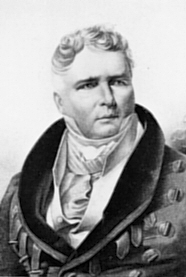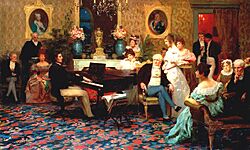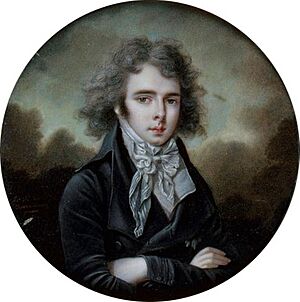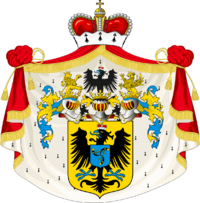Antoni Radziwiłł facts for kids
Quick facts for kids
Antoni Henryk Radziwiłł
|
|
|---|---|

Lithograph after a sketch by Wilhelm Hensel, about 1810
|
|
| Duke-Governor of the Grand Duchy of Posen | |
| In office 1815–1830 |
|
| Preceded by | new creation |
| Succeeded by | Eduard Heinrich von Flottwell (as Oberpräsident) |
| Personal details | |
| Born | 13 June 1775 Vilnius, Polish–Lithuanian Commonwealth |
| Died | 7 April 1833 (aged 57) Berlin, Kingdom of Prussia |
| Resting place | Poznań Cathedral |
| Spouse | Princess Louise of Prussia |
| Children | Wilhelm Paweł Ferdynand Fryderyk Ludwika Fryderyka Helena Eliza Fryderyka Bogusław Fryderyk Władysław Wanda Augusta Wilhelmina |
| Parents | Michał Hieronim Radziwiłł Helena Przeździecka |
| Residences | Palais Radziwiłł, Berlin |
Prince Antoni Henryk Radziwiłł (born June 13, 1775 – died April 7, 1833) was a Polish and Prussian noble. He was a musician and politician. He was a Duke of Nieśwież and Ołyka. He also held the special title of a Reichsfürst of the Holy Roman Empire. From 1815 to 1831, he served as the Duke-Governor of the Grand Duchy of Posen. This was an area of Poland that became part of Prussia.
Contents
A Look at Antoni Radziwiłł's Life
Antoni Radziwiłł was born on June 13, 1775, in Vilnius. His parents were Michał Hieronim Radziwiłł and Helena Przeździecka. In 1792, he studied at Göttingen University. He was later invited to the court of King Frederick William II of Prussia.
In 1796, he married Princess Louise of Prussia. She was the niece of the famous Prussian king Frederick the Great. His new family encouraged him to help the Polish people living under Prussian rule. He tried to be a link between the Poles and the Prussian government.
During Napoleon's wars in 1806, Antoni tried to get Poles to fight against the French army. He also tried to convince Prince Józef Poniatowski to join Russia and Prussia. But he was not successful. Prussia lost a big battle, and Napoleon's actions led to the creation of the Duchy of Warsaw. Antoni then stayed in his palace in Berlin. He focused on getting back his family's large lands in Russia.
His Role as Duke-Governor

After the 1815 Congress of Vienna, Antoni was sent to Poznań. He became the Duke-Governor there. He represented the Prussian King Frederick William III in the Grand Duchy of Posen.
Antoni tried to balance the needs of his Polish people and the Prussian government. But he had little real power. Other officials, like Oberpräsident Joseph Zerboni di Sposetti, held most of the power.
In 1824, his daughter Elisa was supposed to marry Prussian Prince William (who later became Emperor William I). But this engagement was called off.
When the 1830 November Uprising started in Russian Poland, Antoni lost all his powers. His brother Michał Gedeon Radziwiłł led this uprising. The next year, the Duke-Governor position was removed. The Grand Duchy of Posen lost its special status. It became a regular part of Prussia.
Antoni Henryk Radziwiłł went back to his palace in Berlin. He died there on April 7, 1833. He was buried in the Poznań Cathedral. His children grew up more German. They did not return to Poznań often. But they owned large family lands in today's Belarus and near Warsaw. They visited these areas frequently.
Supporting Artists
Antoni Radziwiłł is perhaps best known for supporting artists. His homes in Berlin, Poznań, and Antonin were famous for their concerts. Many great musicians of his time performed there.
Antoni himself played the guitar and cello. He also performed in operas. Famous guests included Niccolò Paganini, Johann Wolfgang von Goethe, Frédéric Chopin, and Ludwig van Beethoven.
- Chopin wrote his Introduction and Polonaise Op. 3 for cello and piano especially for Antoni.
- Chopin also performed a concert at Antoni's palace in Poznań in 1828.
- Chopin dedicated his Piano Trio Op. 8 to Antoni.
- Beethoven dedicated his Ouverture Op. 115 to him.
- Goethe worked with Antoni on music for his play Faust.
- Maria Agata Szymanowska dedicated her Serenade pour le Pianoforte avec le accompagnement de violoncelle to him.
Antoni also supported Polish theaters. His wife opened the first public school for girls in Poznań in 1830.
Awards and Honors
 Polish-Lithuanian Commonwealth: Knight of the Order of the White Eagle, September 6, 1793; December 1, 1815
Polish-Lithuanian Commonwealth: Knight of the Order of the White Eagle, September 6, 1793; December 1, 1815 Kingdom of Prussia:
Kingdom of Prussia:
- Knight of the Order of the Red Eagle, 1795
- Knight of the Order of the Black Eagle, March 16, 1796
 Kingdom of Bavaria: Knight of the Order of Saint Hubert, 1825
Kingdom of Bavaria: Knight of the Order of Saint Hubert, 1825 Sovereign Military Order of Malta: Knight of Honour and Devotion
Sovereign Military Order of Malta: Knight of Honour and Devotion
See also
 In Spanish: Antoni Radziwiłł para niños
In Spanish: Antoni Radziwiłł para niños
- Trąby coat of arms
- Radziwiłł
 | Aaron Henry |
 | T. R. M. Howard |
 | Jesse Jackson |



